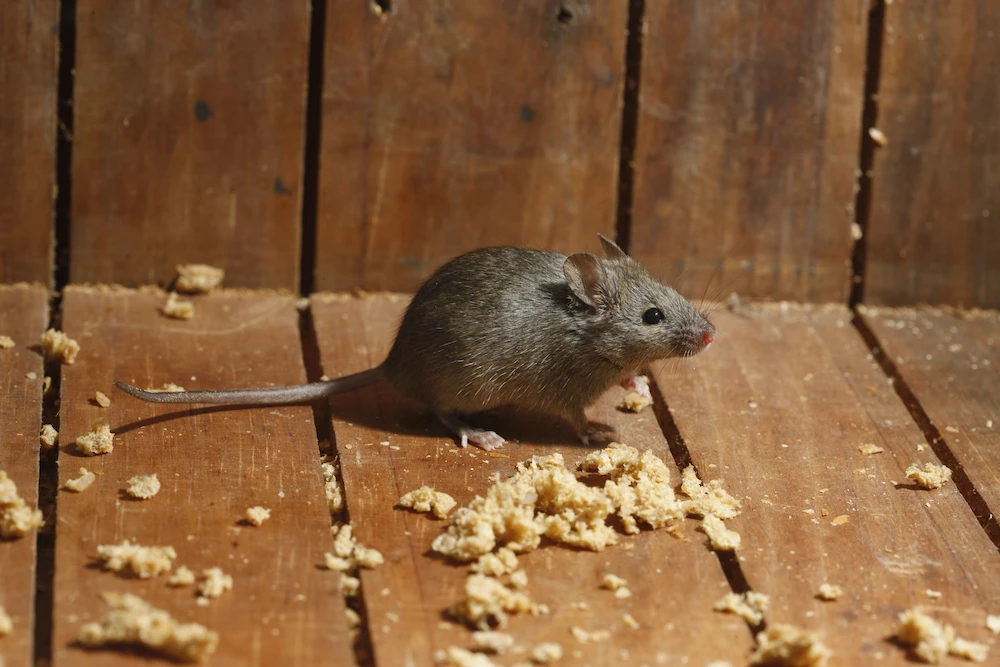Summary: Every pest starts (or continues) their activities in spring, and house mice are no different. This blog details the lives of house mice in Texas, from their destructive habits to their constant reproduction. It ends with Romney’s house mice prevention methods. Romney Pest Control provides thorough rodent control for Texas homes.
Rodents love winter, and they only get busier during the warm seasons! Like most pests, spring motivates mice to search for food and reproduce. They aren’t afraid to venture outside for either of these, but they would still rather live in our cozy homes. This surge in activity makes it feel like there’s a million mice in Texas throughout spring and summer. That number is an exaggeration, but the risks and issues of a mice infestation are no small thing.
If you’ve been searching for information on Texas mice, look no further! We’re about to dive into the habits, preferences, and risks of the most common rodent pest in the country…
The Infamous House Mouse
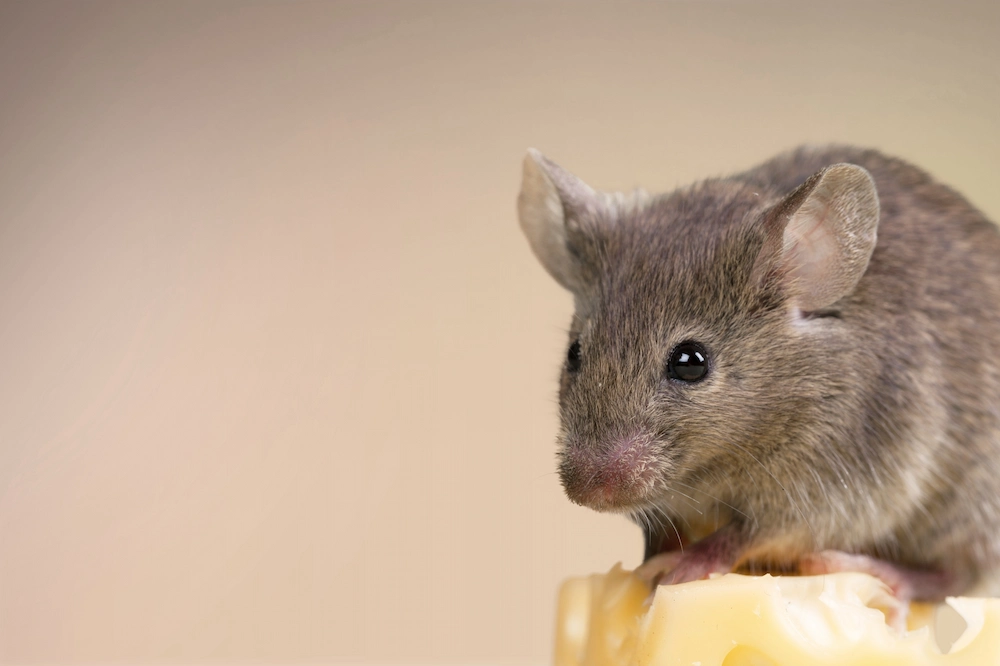
The house mouse is the most common mouse pest in the United States. Its name comes from the mouse’s tendency to live inside a house for its entire life. These mice wreak havoc in every home they invade. From their ravenous appetites to their constant reproduction, house mice are one of the most frustrating pests to have in your home.
They say you need to know your enemies, so let’s get into the basics of house mice. Their physical features include:
- A length of 3 to 4 inches
- White belly
- Round body
- Brown, tan, white, or gray coloring
- Fuzzy tail
- Large ears
- Long whiskers
House mice are also pretty active. They can jump, climb, and swim short distances. There are few places that house mice can’t invade. They’ll squeeze through holes the size of a dime in order to get to their desired shelter. These mice can live for 1 to 3 years in an indoor environment, and they are very busy during those years.
Their Quest for a Home
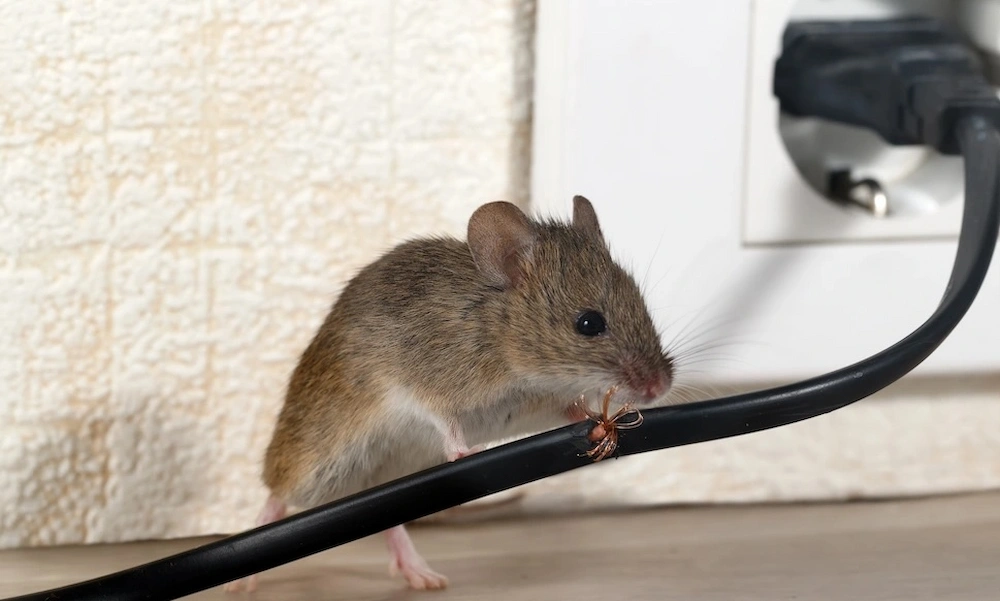
House mice don’t have strict criteria for their living situations. They just want to stay somewhere that’s dark, isolated, and sheltered. In a typical house, their favorite rooms are the basement, attic, and garage. They also like closets and sheds. Once house mice are established in a home, it’s difficult to remove them without professional services (more on this later).
Mice are some of the quickest and quietest invaders, which makes it hard to find them until the problem grows. Female mice have hundreds of pups in their lifetimes. They are able to reproduce at just 6 weeks old. Each of their litters has an average of 5 to 6 pups, but they can have up to 12. Female house mice need a shelter (aka our homes) before they feel safe to reproduce
Good Food
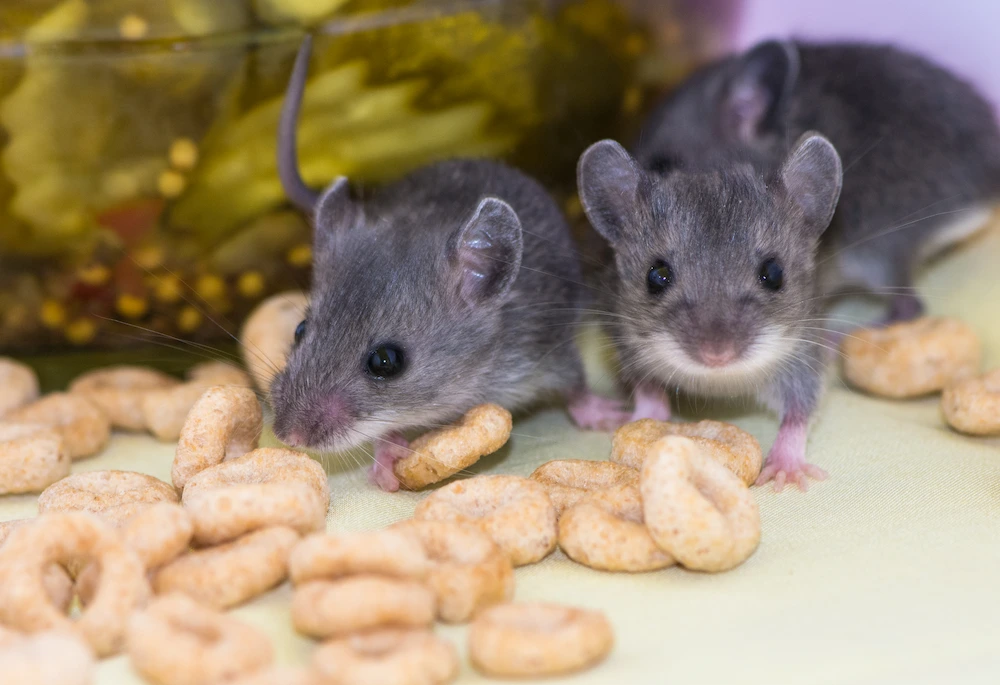
A mouse’s metabolism is so fast that it needs to constantly eat in order to keep up its strength. The house mouse is always on the hunt for safe food sources that will keep it and its family sustained. Unfortunately for us, our homes have so much food that any invading house mice would have a never-ending buffet ahead of them.
House mice have great senses of smell and hearing, so they’re equipped to find great food sources. They often forage in garbage and compost piles (gross!), but they never object to the fresh food we enjoy. They mostly enjoy fruits and dry goods, like grains, nuts, bread, pasta, and snack foods. They also love dry pet food, so even your furry friend’s meals aren’t safe!
Although house mice can go a month without water, they can only go 2 to 4 days without food. This desperation leads them to do whatever it takes to get food. Their strong teeth cut through packaging and household materials, including cardboard and plastic. When mice are hungry, they’ll stop at nothing to get food!
Health Risks
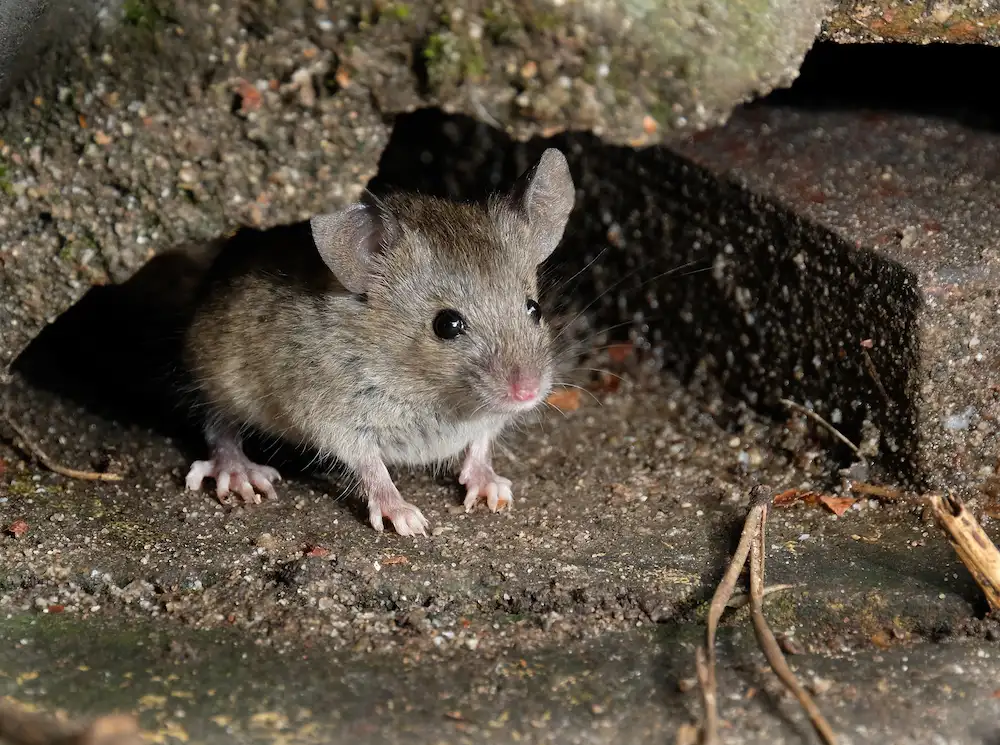
When we talk about house mice, we need to mention the health risks they bring. These pests contaminate everything they touch. They carry dangerous bacteria that’s found in their droppings, urine, and paws. They can transmit this bacteria directly (bites) or indirectly (walking on surfaces) to humans.
House mice can transmit a variety of diseases to us, including hantavirus, salmonella, gastritis, E. coli, and leptospirosis. Mice can even have pests of their own that they can spread around! Fleas and ticks feed on mice, like they would on any other mammal. A mice infestation could lead to a flea or tick problem if the mice are carrying these pests.
Please seek medical attention if you or your family starts having symptoms following a rodent infestation.
Why Invade Our Homes?
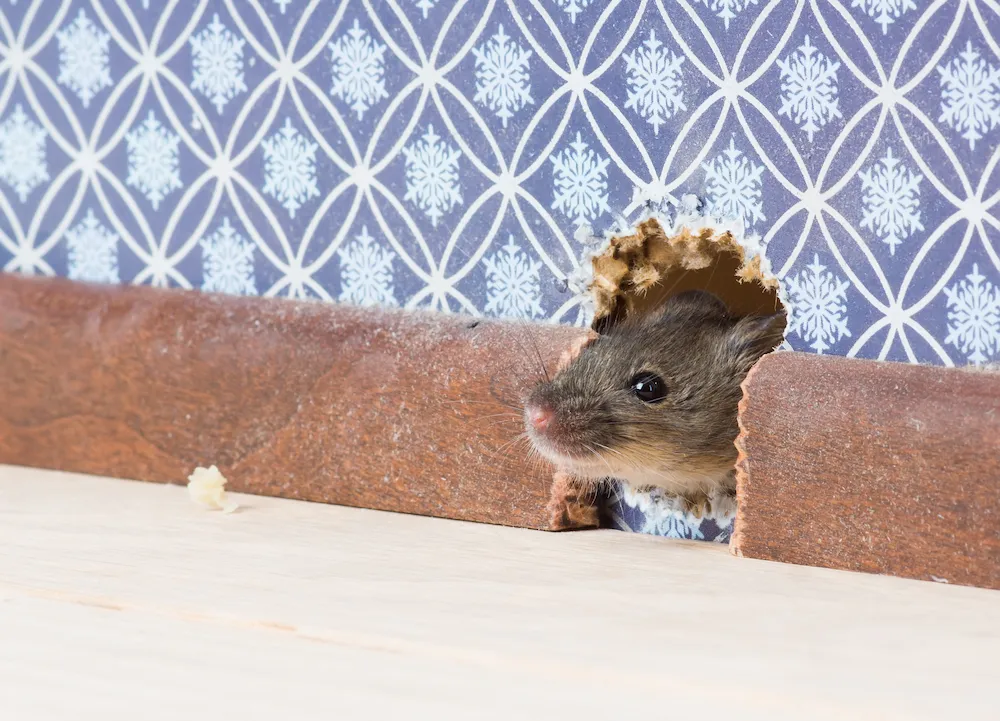
This question may be on your mind after reading about all of the things that house mice want. After all, couldn’t they do all of this in a cave somewhere? Well, house mice want the constant food, water, and shelter that our houses provide. They want to feel safe while they’re busy with these tasks.
Since spring is breeding season for mice, they need a roomy shelter to fit all of their incoming pups. These are social pests. When you see one mouse, chances are good that there are a lot more living nearby. They could be somewhere in your yard or a neighbor’s house, but their nest could also be located somewhere inside your home.
Signs of a Mice Invasion
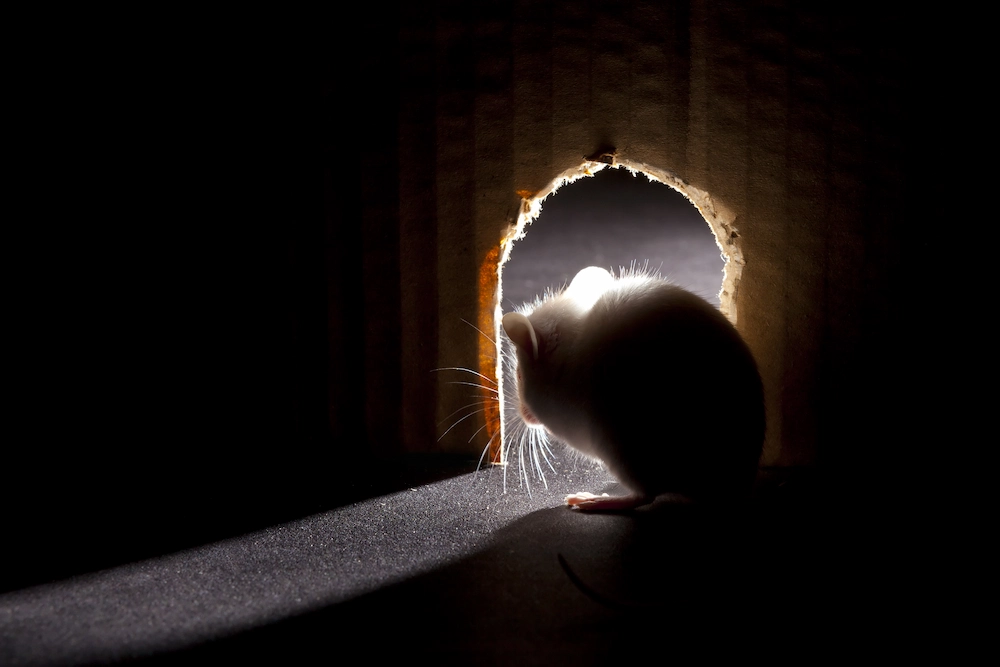
It’s entirely possible to treat huge mice infestations, but it’s much more efficient to catch a problem in its early stages. This involves keeping an eye out for the warning signs, then taking action when an issue arises.
The most common signs of a house mice invasion are:
- Scratching/scraping sounds
- Droppings
- Urine streaks
- Squeaking
- Gnaw marks
- Musty odor
- Shredded paper/fabric materials (for their nests)
- Live or dead mice
How to Prevent Mice
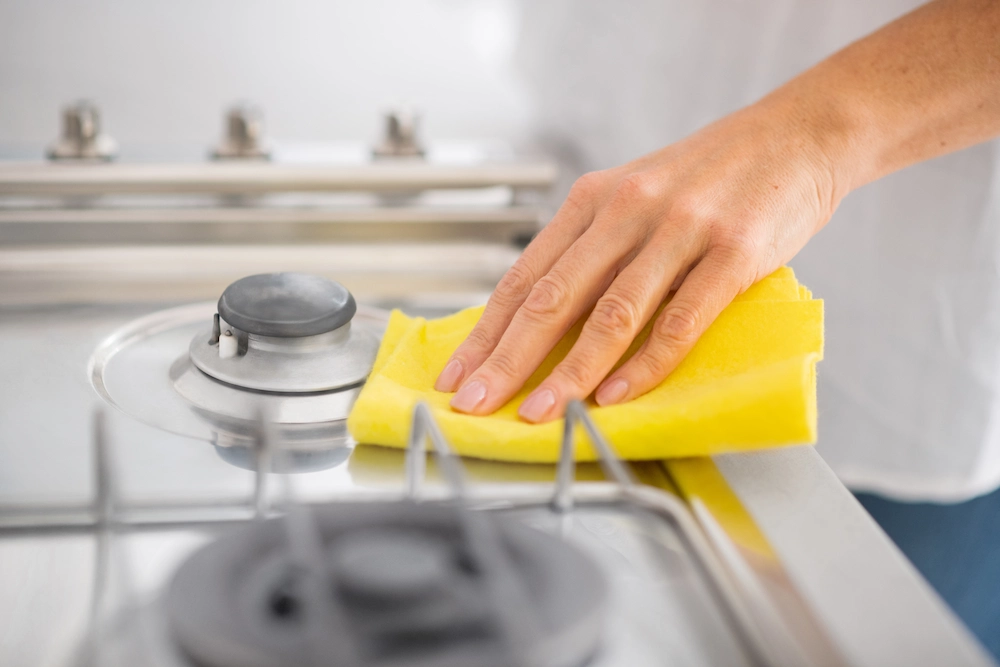
All of this talk about how terrible house mice are makes us want to talk about the best ways to prevent them. The great news is that these prevention methods are standard chores that you probably do already!
Our favorite ways to prevent house mice are:
- Seal Entry Points — Inspect your house’s exterior for any cracks and gaps that would allow house mice inside. Seal small ones with caulk, and fill larger holes with steel wool before lining with caulk.
- Store Food Properly — The simplest way to protect food from mice is with good containers. Store all pantry essentials (baking ingredients, cereal, etc.) in airtight containers.
- Clean the Kitchen Daily — You don’t have to deep-clean every day (unless you want to), but wiping down counters and eating surfaces with an antibacterial cleaner is great for removing stray crumbs.
- Repair Leaks — Leaky plumbing gives mice a safe water source. If you see any leaks in your house’s plumbing, get them fixed ASAP.
- Inspect Screens and Seals — And we’re not talking about the barking sea animals. Check the window screens, door seals, and weather stripping for wear and tear. Replace any that are loose or ripped.
- Trim Back Plants — Plants and tree branches that touch the house act as pathways for pests. Trim back all plants at least one foot from the house.
- Keep Trash Contained — Trash cans have a lot of food sources for hungry mice. Take out the indoor trash before it’s overflowing, and keep the outdoor garbage can lids closed.
Romney is the Big Cheese of Pest Control
Rodent problems can feel overwhelming, but they don’t have to be! The licensed technicians of Romney Pest Control are no strangers to rodent infestations. After locating the active areas, our team applies the proper treatments based on the invasion’s location and species. Our goal is to solve the problem as safely and efficiently as possible. We only utilize treatments that we know to be completely effective against pests while still being safe for humans and pets.
Effective rodent control is just a click away. Contact us for a free quote on our reliable pest control services today!
Citations
Donovan, B. (2025, January 30). How to get rid of mice in your house, according to a pest control expert. Country Living. Available at https://www.countryliving.com/home-maintenance/a26935824/how-to-get-rid-of-mice/ (Accessed on March 19, 2025).
The life cycle of a mouse. (n.d.). Terminix. Retrieved March 19, 2025, from https://www.terminix.com/rodents/mice/life-cycle/

